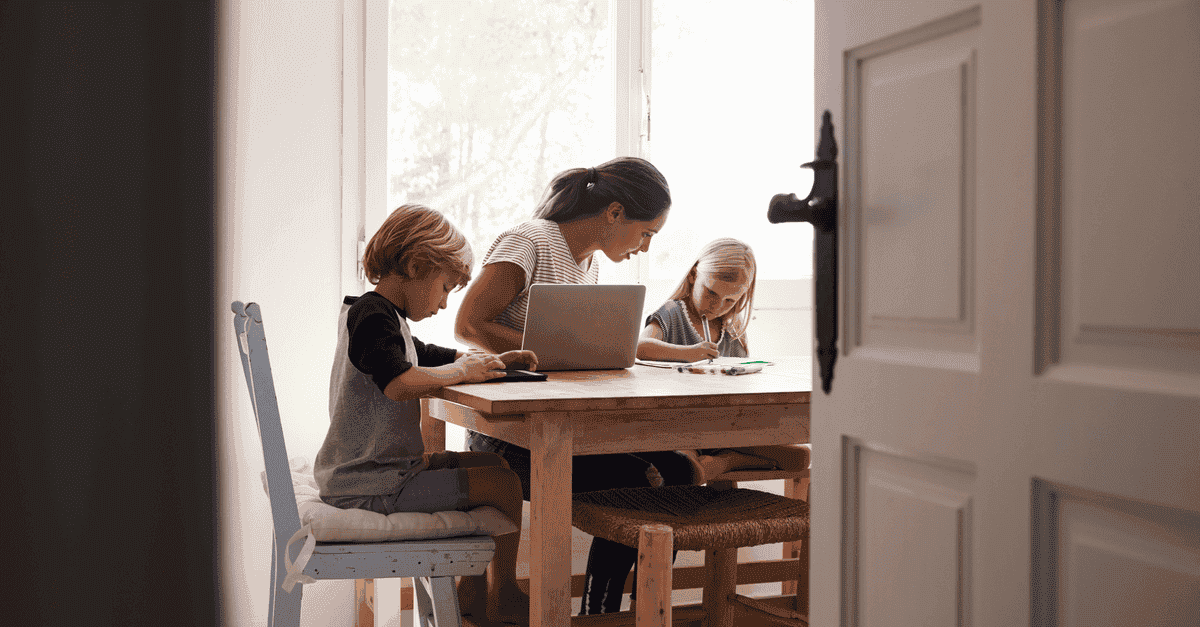- As kids prepare to make long-awaited returns to school, Internet Matters says ‘we need to accept technology will play an even bigger role in children’s everyday school life’.
- It comes as a new survey that looks at the impact of remote learning during the third lockdown, in particular, life lessons and how it may affect children.
- With remote live lessons still in place for many, Psychologist and Internet Matters Ambassador Dr Linda Papadopoulos shares practical tips for parents with kids experiencing issues
- SWGfL (South West Grid for Learning) launch a social media campaign to raise awareness about young people’s mental health when remote learning during lockdown.
The survey* asked parents whether having their camera on during live lessons has affected their children’s mental health. While the majority of parents (46%) agreed that life lessons gave their children an opportunity to remain ‘visibly connected’, four out of 10 (41%) said they had made their child more self-conscious about their identity and how they look on camera.
In addition, 43% said their child found it hard to speak up during live lessons and 37% said they were more anxious than normal when asked to attend with their camera on.
With remote live lessons likely to stay in place for many pupils for some time, Internet Matters has launched a series of videos with its ambassador and child psychologist Dr Linda Papadopoulos who gives expert advice on how to support your children if they are finding it hard to have their camera on during live lessons.
The videos target parents of both primary and secondary school age, focusing on what positive steps they can take from helping them manage any anxieties they have to deal with individual issues.
Fellow safety organisation SWGfL (South West Grid for Learning) is also launching a social media campaign for children aged 13 – 18 letting them know that they are not alone in the issues they have faced during lockdown and remote learning. They collaborated with Priory Learning Trust and Headstart Kernow and interviewed over 600 pupils who agreed that tech can be a blessing but can also present a number of wellbeing issues. The campaign shares the lockdown experiences of a group of children and the innovative ways in which they are coping.
The majority agreed that whilst it’s been great in enabling them to stay connected and keep up with school work, they have become so reliant on tech that they can sometimes feel tied down to it. The Instagram campaign will present short videos where 13 – 18-year olds talk about how they cope with the everyday stresses of lockdown learning and raise awareness of what young people can do to support their mental health.
Internet Matters survey also looked into what parents thought the legacy of home-schooling would be. Over half (52%) said they were worried about the long-term impact online learning will have on their children’s confidence and self-esteem, with nearly four out of 10 (39%) wanting more help on how to deal with it.
Online safety was also a growing concern for parents as a result of lockdown – as over half (53%) want schools to teach children more about it and 47% said they need more help with it themselves.
Increased screen time was another concern as over half (52%) of parents said they are worried about the amount of time their child has to spend on digital devices each day due to lockdown.
Carolyn Bunting, CEO of Internet Matters, said: “It’s understandable that parents may be worried about the long-term impact of lockdown on their children and many might be confused about what is beneficial for them and what might be causing them distress.
“What’s clear is we need to accept technology will play an even bigger role in children’s everyday school life including remote live lessons.
“We’re pleased to be able to offer help and support through the resources on our website including some new videos which tackle how to support your child if having a camera on during lessons is causing them any anxiety.”
Dr Linda Papadopoulos said: “Right now, it’s understandable that parents will be worried about the impact of remote learning on their kids, especially when it comes to video lessons. But there are many positive steps they can take to help.
“For younger children, it’s about managing the basics, ensuring they can see and hear well and keeping them engaged with support from the school.
“When it comes to older children, they are much more socially aware, so it’s important to help them manage any anxieties and individual issues they have, not letting them feel like they are more exposed during online lessons than they usually are.
“It’s also about reinforcing the idea that this is a moment in time that’s affected us all, but it doesn’t have to be something that affects who we are, it’s temporary.”
David Wright, Director of UK Safer Internet Centre, said: “Tech has ensured young people can continue to learn, socialise and communicate during this third lockdown – however, we know there are many issues that they have faced along the way.
“Through our survey, we found that many children are facing the same struggles whether that’s issues with having their camera on during live remote lessons to concerns over being too reliant on tech.
“What’s important is that children know they are not alone in the issues they have faced and can feel a sense of achievement as they look to head back to the classroom for the first time this year.”
**WIN THE ULITMATE VIRTUAL CELEBRATION KIT** Guess what? It’s our 24th birthday, and like the rest of the UK, COVID has ruined our party plans. It’s almost been a whole year since we first went into lockdown, which means almost everyone has celebrated a lockdown birthday by now. By ‘celebrate’, we mean joining a Zoom call and going to bed at 11pm. We’ll, we’re here to help you make the most of your virtual celebrations. To celebrate our birthday, we’re giving away a virtual lockdown celebration kit for you and two friends. We’re going to make sure you’re all equipped with the best sounds and snacks to get the (virtual) party started. #ThatllDo The kit includes: A Bose Micro Speaker A ‘Best of Yorkshire’ hamper from our friends at the Little Yorkshire Hamper company. We’re talking Yorkshire Gin. Yorkshire Crisps. Yorkshire Jam. You get the picture. And a Spotify 365-day subscription (because nothing kills the party mood like adverts!) To enter, all you need to do is 1) follow Plusnet on Instagram 2) like this post 3) tag two friends in the comments you’d like to party with. GOOD LUCK! T&Cs in bio.
To watch Dr Linda Papadopoulos video series and learn more about online safety and how to support your child, head to www.internetmatters.org/remote-learning-tips.
To follow the SWGfL Instagram campaign head to: www.instagram.com/swgfl_official
Dr Linda’s tips for primary school parents:
1. Start with the basics
- Can they see the screen well?
- Can they hear the teacher well?
- Do they feel seen and heard by the teacher?
- How are they being called on in class?
- If they’re shy how can we use technology to support this?
2. Keep them engaged
- Discuss with their schools, how can you maintain their interests and involvement, how do you keep them engaged over extended periods?
- When they’re really little, those focuses come in little short bursts for both, but especially for boys
- If you can, work near your child so you can be checking in on them every so often.
- There can sometimes be a disconnect between what parents think their kids are doing and what they’re actually doing, and how much time they actually spend doing it.
3. Keep checking in with them and adapt
- Don’t stop checking in with your child. It’s about working to their needs with their teacher and technology so they can have a better experience.
Dr Linda tips for secondary school parents:
1. Help them manage their anxiety
- At this age, children are extremely socially aware, and their digital self is often very separated from their real selves.
- If your child is anxious about being seen ‘on camera’ during live lessons, this is something to be challenged.
- Try not to escalate the anxiety by making them feel that they’re more exposed than they usually are on camera. They’re usually in school sitting next to classmates which is exposure.
- It could be that your child sees a big picture of themselves on screen they feel more self-aware but everyone’s very self-aware and in the same situation.
2. Breakdown individual issues
- Look at any individual issue and think about how to break them down.
For example, if your child says “I don't like my room and I don’t want my classmates to see”, there are lots of ways to deal with it. If they genuinely aren’t secure about their room, deal with it by making them feel good about it. Teach them it’s not about money or about belongings.
- Explore options with the school, in this case, can they change or blur the background of their screen?
3. Technology is making us more aware of issues
- Is your child having issues coming off mute and speaking up in class?
- Did they always have an issue speaking up? Is this something new? I would guess that they did but are probably much more aware of it now.
- Speak to the teachers and school to find out more and work with them on solutions.
4. Teach them self-acceptance
- Some children are so used to seeing filtered versions of themselves.
- Seeing pictures on the camera that are the real you is about self-acceptance.
- If this is an issue, get them to question their thoughts and feelings and teach them critical thinking.
5. Reassure them who they are hasn’t changed
- For a lot of young people their identity online has been mixed up, but don’t let that become an issue.
- It’s important not to allow a point in time or a change in time to become a personality trait. Just because they can’t do a certain hobby doesn’t mean they’re a boring person.
- Encourage them to keep things up in ways they can whether that’s organising something online or going for a walk in a park.
- Reinforce the idea that this is a moment in time that’s affected us all, but it doesn’t have to be something that affects who we are. It’s something that’s affecting a moment in time, it’s temporary.
*Research commissioned by Internet Matters of 2,001 UK adults of which 497 were parents via Opinium.
About Internet Matters
Internet Matters (internetmatters.org) is a not-for-profit, industry-funded members body that helps families stay safe online, providing resources for parents, carers and educational professionals. It was established in 2014 by BT, Sky, TalkTalk and Virgin Media and its members include BBC, Google, Samsung, Facebook, Huawei, ByteDance, Supercell and ESET. It is a member of the Executive Board of UKCIS (UK Council for Internet Safety), where it leads the working group for vulnerable users and was a member of The Royal Foundation Taskforce on the Prevention of Cyberbullying, founded by the Duke of Cambridge. It works with partners from across the industry, government and third sector to raise awareness and provide advice on the issues affecting children in the digital age, including cyberbullying, screen time, digital resilience, extreme content, privacy and exploitation.
Media Contact for Internet Matters
Katie Louden
[email protected]
Mobile: 07850428214





